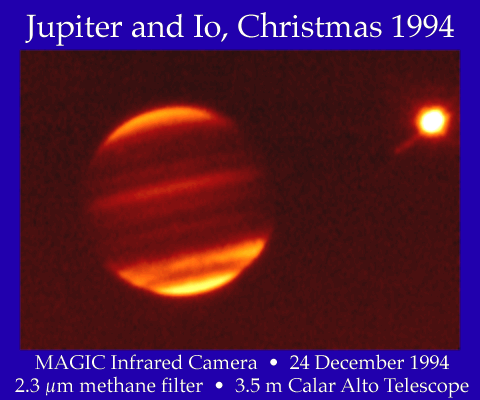

This image of Jupiter and its innermost bright moon, Io, was taken at 7:00 UT on the 24th of December using the MAGIC infrared camera on the 3.5 meter Calar Alto telescope. Methane absorption in the jovian atmosphere darkens the cloud deck at the wavelength of observation, 2.3 microns. The plate scale is 0.32 arcseconds per pixel. Ejecta from the impacts of approximately twenty fragments of Comet Shoemaker-Levy 9 in July 1994 created the prominent band in the southern hemisphere. The band shines by reflected sunlight, since the ejected material lies above the absorbing layer of methane.
This exposure is similar to those taken earlier in December at a wavelength of 1.7 microns with the MAGIC camera. The planetary disk is darker at 2.3 microns than at 1.7 microns, enhancing the prominence of the impact structures. The better spatial resolution and improved contrast of the current image shows substructure in the ejecta band, which now completely encircles the planet.
Image Information:
24 December 1994, 7:00 UT
MAGIC Infrared Camera (256x256 HgCdTe Detector); 2.3 um CH4 absorption filter
3.5 m f/10 Calar Alto Telescope; 0.32 arcseconds / pixel
Picture Credits: Tom Herbst, Peter Bizenberger (Max-Planck-Institut fuer Astronomie); K. Reinsch, V. Burwitz (Goettingen) Contact People: Tom Herbst, Max-Planck-Institut fuer Astronomie, Heidelberg Doug Hamilton, Max-Planck-Institut fuer Kernphysik, Heidelberg